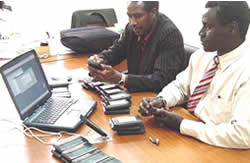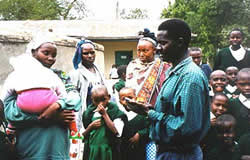 |
|
|
"There is an urgent need to improve healthcare in Africa, where close to 3,000 people are dying every day from AIDS. SATELLIFE and Skyscape are rallying resources and technology to help doctors gain easy access to medical data to provide better healthcare," said Holly Ladd, Director of SATELLIFE. "Though African doctors are well-trained professionals, their computing resources are limited - the average U.S. America Online (AOL) user has access to more medical information than many doctors in Kenya and Uganda. The information problem is even greater in rural locations where doctors cannot access the up-to-date information they need as they treat patients." Breaking Down The Barriers To Better Care In many African countries, the cost of an Internet connection is more than 20 percent of a doctor's annual salary. For years SATELLIFE has been working to give medical professionals access to the tools and information they need to improve the quality of medical care around the world. But it is estimated that it will take an international government and business initiative of US$7-10 billion to combat HIV/AIDS, in addition to developing the infrastructure required to train worldwide medical communities in order to improve the quality of medical care. Handheld devices solve a major medical hurdle by enabling quick and easy access to critical information-giving medical practitioners the capability to retrieve information about a disease on the spot or evaluate the effectiveness of different drugs based on a certain patient profile within seconds. Today in the U.S., more than one in four doctors use handheld devices, and the number is projected to grow to more than 50 percent in the next two years. But in Africa, the number of doctors who have even any computer access is extremely low. Where they are accessible, they are often shared by as many as 30 doctors.
"The ability to leapfrog into the latest handheld technology holding the most advance medical references in the world is now a reality for medical practitioners in developing countries. Much like cell phones have provided telecommunications to remote areas, handhelds are providing critical medical information to previously inaccessible areas," said RJ Mathew, vice president of marketing and business development, Skyscape. About the SATELLIFE PDA Program SATELLIFE, a non-profit based in Boston, has been providing health
and medical information to the developing world for 12 years.
The SATELLIFE PDA program loads PDAs with the latest medical texts,
field surveys, health references and guides for diagnosing diseases
and ships them to medical professionals working in Africa. In
Kenya and Uganda, PDAs are being used to get critical health information
to doctors. SATELLIFE provided more than 80 PDAs loaded with software
from Skyscape, half to medical students in Kenya (Moi University
Medical School), and the other half to practicing doctors in Uganda
(Makerere University Medical School). The PDAs, which were obtained
via a grant to SATELLIFE from the Acumen Fund, were loaded with
an easy-to-use malaria survey and medical content. For more information
or to provide resources to this life saving program, please visit
the SATELLIFE
PDA Project website.
|
|||||||||||


